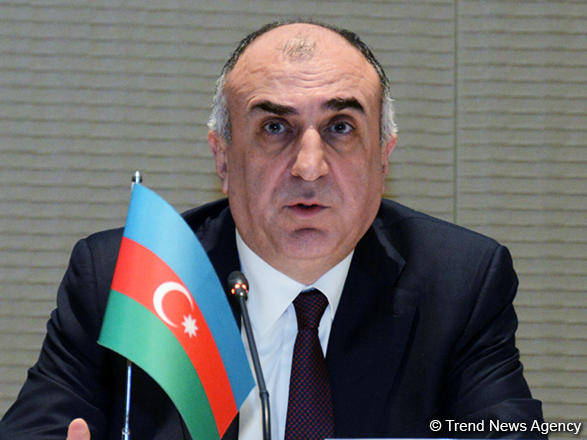Baku, Azerbaijan, Dec. 8
Trend:
Unlawful presence of the Armenian armed forces in the occupied Azerbaijani territories is the major impediment to political settlement of the Nagorno-Karabakh conflict, said Azerbaijani Foreign Minister Elmar Mammadyarov at the OSCE Ministerial Council meeting in Hamburg Dec. 8.
The minister said that unresolved armed conflicts and crises in the OSCE area, new wave of terrorist attacks across Europe and beyond, and large-scale displacement of people due to the conflicts are among the acute problems that continue to endanger peace and security and require urgent action.
“The unlawful presence of the Armenian armed forces in the occupied Azerbaijani territories remains the main cause of escalation in the conflict zone and is the major impediment to political settlement of the conflict,” he noted.
Mammadyarov said also that the April escalation of the conflict was a vivid reminder that today’s situation existing on the line of contact of Armenian and Azerbaijani troops is dangerous and has a potential to worsen at any time with unpredictable consequences.
“It is plausible that there is almost a unanimous position within OSCE that the status quo in the Armenia-Azerbaijan Nagorno-Karabakh conflict is unsustainable and must change,” he added. “Azerbaijan is the most interested party in moving beyond the current status quo. In this context, we assess the high-level substantive discussions in Vienna and St. Petersburg as positive steps in the right direction and we are thankful to the co-chair countries, particularly to the President of the Russian Federation, Mr. Vladimir Putin, for all his efforts in this regard.”
“We must sustain the momentum and transform the understandings reached in those meetings into concrete actions without further delay,” said the foreign minister. “We expect the OSCE and its Minsk Group to play an instrumental role to this end.”
He noted that a step-by-step elimination of the conflict’s consequences, starting with withdrawal of the Armenian armed forces from the occupied Azerbaijani territories, restoration of regional transportation and communication links and safe and dignified return of displaced persons to their places of origin, while addressing security concerns appropriately, will transform the conflict dynamics and significantly improve the overall security environment in the whole region.
This approach is based on the relevant UN Security Council resolutions and affirmed in the decisions of the OSCE, notably in the Budapest Summit decision of 1994, added Mammadyarov.
The minister said that as confidence-building measures, agreement was reached to expand the Office of the Permanent Representative of the Chairman-in-Office, provided that this expansion is synchronized with substantive negotiations and does not change Office’s mandate and modus operandi.
“Azerbaijan submitted its proposal in this regard and we expect constructive talks to this end as we are speaking about activities of this mission on the sovereign and internationally recognized territories of Azerbaijan,” he noted.
“Unfortunately, statements that we hear through the last few months from the Armenian side do not give a reason for optimism and indicate the apparent unwillingness of the Armenian side to engage constructively in result-oriented talks,” said Mammadyarov.
He went on to add that attempts to precondition the substantive negotiations undermine the Vienna and St. Petersburg agreements and pursue the obvious goal to derail the peace process.
Mammadyarov noted that continued efforts of Armenia to strengthen its military build-up in the occupied territories of Azerbaijan, illegally change the demographic, cultural and physical character of these territories undermine trust and reveal true intentions of the Armenian side.
“The months ahead will demonstrate if Armenia is a serious partner for peace, genuinely interested in engaging constructively in substantive negotiations to resolve the conflict or we will continue down the road of further instability and conflict,” added the minister.
The conflict between the two South Caucasus countries began in 1988 when Armenia made territorial claims against Azerbaijan. As a result of the ensuing war, in 1992 Armenian armed forces occupied 20 percent of Azerbaijan, including the Nagorno-Karabakh region and seven surrounding districts. The 1994 ceasefire agreement was followed by peace negotiations.
Armenia has not yet implemented four UN Security Council resolutions on withdrawal of its armed forces from the Nagorno-Karabakh and the surrounding districts.






